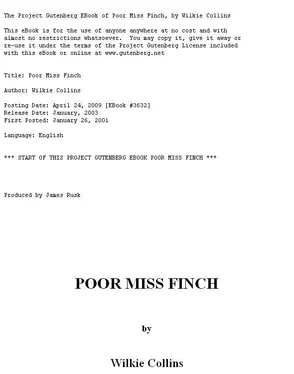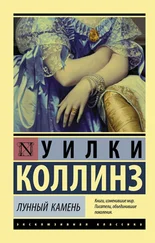Уилки Коллинз - Poor Miss Finch
Здесь есть возможность читать онлайн «Уилки Коллинз - Poor Miss Finch» весь текст электронной книги совершенно бесплатно (целиком полную версию без сокращений). В некоторых случаях можно слушать аудио, скачать через торрент в формате fb2 и присутствует краткое содержание. Год выпуска: 2002, Жанр: Классическая проза, на английском языке. Описание произведения, (предисловие) а так же отзывы посетителей доступны на портале библиотеки ЛибКат.
- Название:Poor Miss Finch
- Автор:
- Жанр:
- Год:2002
- ISBN:нет данных
- Рейтинг книги:3 / 5. Голосов: 1
-
Избранное:Добавить в избранное
- Отзывы:
-
Ваша оценка:
- 60
- 1
- 2
- 3
- 4
- 5
Poor Miss Finch: краткое содержание, описание и аннотация
Предлагаем к чтению аннотацию, описание, краткое содержание или предисловие (зависит от того, что написал сам автор книги «Poor Miss Finch»). Если вы не нашли необходимую информацию о книге — напишите в комментариях, мы постараемся отыскать её.
Poor Miss Finch — читать онлайн бесплатно полную книгу (весь текст) целиком
Ниже представлен текст книги, разбитый по страницам. Система сохранения места последней прочитанной страницы, позволяет с удобством читать онлайн бесплатно книгу «Poor Miss Finch», без необходимости каждый раз заново искать на чём Вы остановились. Поставьте закладку, и сможете в любой момент перейти на страницу, на которой закончили чтение.
Интервал:
Закладка:
I managed to ask my first question so as to make him enter on the subject at once—without wasting time in phrases to prepare me for what was to come.
"When my aunt mentioned that letter at dinner yesterday," I said, "I fancied that you knew something about it. Was I right?"
"Very nearly right," he answered. "I can't say I knew anything about it. I only suspected that it was the production of an enemy of yours and mine."
"Not Madame Pratolungo?"
"Yes! Madame Pratolungo."
I disagreed with him at the outset. Madame Pratolungo and my aunt had quarreled about politics. Any correspondence between them—a confidential correspondence especially—seemed to be one of the most unlikely things that could take place. I asked Oscar if he could guess what the letter contained, and why it was not to be given to me until Grosse reported that I was quite cured.
"I can't guess at the contents—I can only guess at the object of the letter," he said.
"What is it?"
"The object which she has had in view from the first—to place every possible obstacle in the way of my marrying you."
"What interest can she have in doing that?"
"My brother's interest."
"Forgive me, Oscar. I cannot believe it of her."
We were walking, while these words were passing between us. When I said that, he stopped, and looked at me very earnestly.
"You believed it of her, when you answered my letter," he said.
I admitted that.
"I believed your letter," I replied; "and I shared your opinion of her as long as she was in the same house with me. Her presence fed my anger and my horror of her in some way that I can't account for. Now she has left me—now I have had time to think—there is something in her absence that pleads for her, and tortures me with doubts if I have done right. I can't explain it—I don't understand it. I only know that so it is."
He still looked at me more and more attentively. "Your good opinion of her must have been very firmly rooted to assert itself in this obstinate manner," he said. "What can she have done to deserve it?"
If I had looked back through all my old recollections of her, and had recalled them one by one, it would only have ended in making me cry. And yet, I felt that I ought to stand up for her as long as I could. I managed to meet the difficulty in this way.
"I will tell you what she did," I said, "after I received your letter. Fortunately for me, she was not very well that morning; and she breakfasted in bed. I had plenty of time to compose myself, and to caution Zillah (who read your letter to me), before we met for the first time that day. On the previous day, I had felt hurt and offended with her for the manner in which she accounted for your absence from Browndown. I thought she was not treating me with the same confidence which I should have placed in her, if our positions had been reversed. When I next saw her, having your warning in my mind, I made my excuses, and said what I thought she would expect me to say, under the circumstances. In my excitement and my wretchedness, I daresay I over-acted my part. At any rate, I roused the suspicion in her that something was wrong. She not only asked me if anything had happened, she went the length of saying, in so many words, that she thought she saw a change in me. I stopped it there, by declaring that I did not understand her. She must have seen that I was not telling the truth: she must have known as well as I knew that I was concealing something from her. For all that, not one word more escaped her lips. A proud delicacy—I saw it as plainly in her face, as I now see you—a proud delicacy silenced her; she looked wounded and hurt. I have been thinking of that look, since I have been here. I have asked myself (what did not occur to me at the time) if a false woman, who knew herself to be guilty, would have behaved in that way? Surely a false woman would have set her wits against mine, and have tried to lead me into betraying to her what discoveries I had really made? Oscar! that delicate silence, that wounded look, will plead for her when I think of her in her absence! I can not feel as satisfied as I once did, that she is the abominable creature you declare her to be. I know you are incapable of deceiving me—I know you believe what you say. But is it not possible that appearances have misled you? Can you really be sure that you have not made some dreadful mistake?"
Without answering me, he suddenly stopped at a seat under the stone parapet of the pier, and signed to me to sit down by him. I obeyed. Instead of looking at me, he kept his head turned away; looking out over the sea. I could not make him out. He perplexed—he almost alarmed me.
"Have I offended you?" I asked.
He turned towards me again, as abruptly as he had turned away. His eyes wandered; his face was pale.
"You are a good generous creature," he said, in a confused hasty way. "Let us talk of something else."
"No!" I answered. "I am too deeply interested in knowing the truth to talk of anything else."
His color changed again at that. His face flushed; he gave a heavy sigh as one does sometimes, when one is making a great effort.
"You will have it?" he said.
"I will have it?"
He rose again. The nearer he was to telling me all that he had kept concealed from me thus far, the harder it seemed to be to him to say the first words.
"Do you mind walking on again?" he asked.
I silently rose on my side, and put my arm in his. We walked on slowly towards the end of the pier. Arrived there, he stood still, and spoke those hard first words—looking out over the broad blue waters: not looking at me.
"I won't ask you to take anything for granted, on my assertion only," he began. "The woman's own words, the woman's own actions, shall prove her guilty."
I interrupted him by a question.
"Tell me one thing," I said. "What first made you suspect her?"
"You first made me suspect her, by what you said of her at Browndown," he answered. "Now carry your memory back to the time I have already mentioned in my letter—when she betrayed herself to you in the rectory garden. Is it true that she said you would have fallen in love with Nugent, if you had met him first instead of me?"
"It is true that she said it," I answered. "At a moment," I added, "when her temper had got the better of her—and when mine had got the better of me."
"Advance the hour a little," he went on, "to the time when she followed you to Browndown. Was she still out of temper, when she made her excuses to you?"
"No."
"Did she interfere, when Nugent took advantage of your blindness to make you believe you were talking to me?"
"No."
"Was she out of temper then?"
I still defended her. "She might well have been angry," I said. "She had made her excuses to me in the kindest manner; and I had received them with the most unpardonable rudeness."
My defence produced no effect on him. He summed it up coolly so far. "She compared me disadvantageously with Nugent; and she allowed Nugent to personate me in speaking to you, without interfering to stop it. In both these cases, her temper excuses and accounts for her conduct. Very good. We may, or may not, differ so far. Before we go farther, let us—if we can—agree on one unanswerable fact. Which of us two brothers was her favorite, from the first?"
About that, there could be no doubt. I admitted at once that Nugent was her favorite. And more than this, I remembered accusing her myself of never having done justice to Oscar from the first.
[Note.—See the sixteenth chapter, and Madame Pratolungo's remark, warning you that you would hear of this circumstance again.—P.]
Oscar went on.
"Bear that in mind," he said. "And now let us get to the time when we were assembled in your sitting-room, to discuss the subject of the operation on your eyes. The question before us, as I remember it, was this. Were you to marry me, before the operation? Or were you to keep me waiting until the operation had been performed, and the cure was complete? How did Madame Pratolungo decide on that occasion? She decided against my interests; she encouraged you to delay our marriage."
Читать дальшеИнтервал:
Закладка:
Похожие книги на «Poor Miss Finch»
Представляем Вашему вниманию похожие книги на «Poor Miss Finch» списком для выбора. Мы отобрали схожую по названию и смыслу литературу в надежде предоставить читателям больше вариантов отыскать новые, интересные, ещё непрочитанные произведения.
Обсуждение, отзывы о книге «Poor Miss Finch» и просто собственные мнения читателей. Оставьте ваши комментарии, напишите, что Вы думаете о произведении, его смысле или главных героях. Укажите что конкретно понравилось, а что нет, и почему Вы так считаете.






